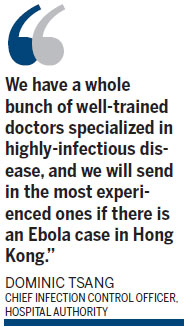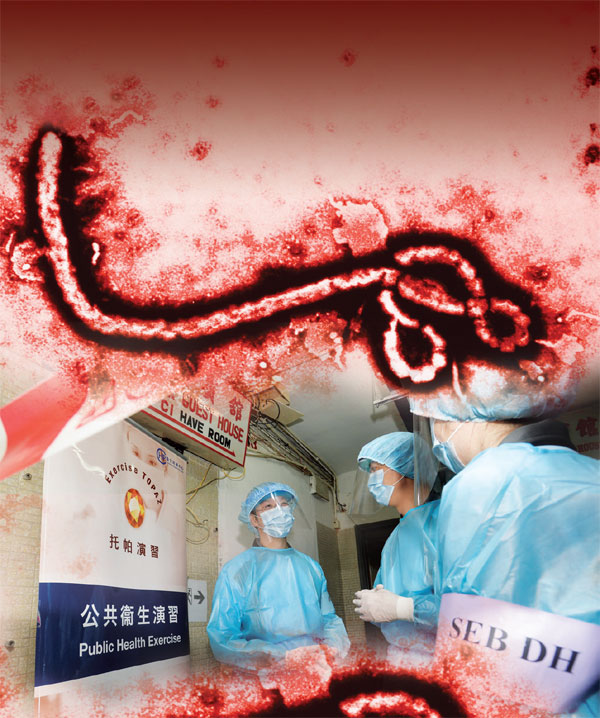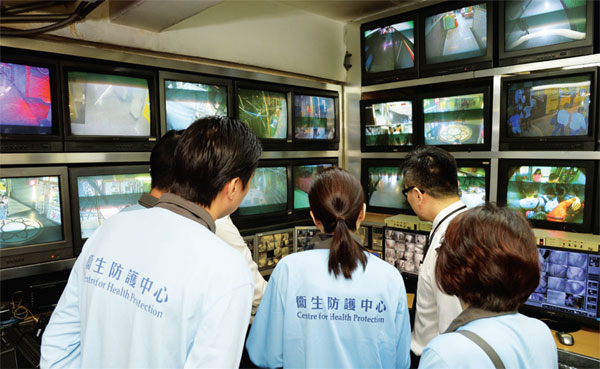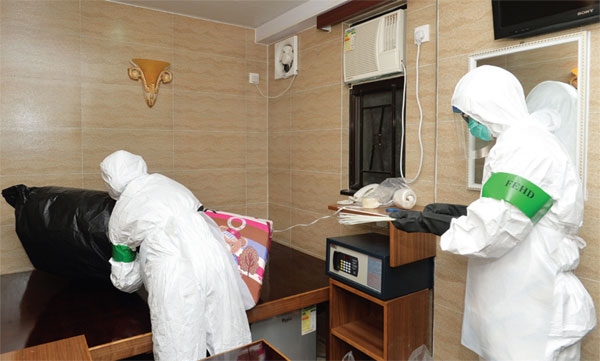Keeping out Ebola
Updated: 2014-11-11 08:22
By Andrea Deng(HK Edition)
|
|||||||||
In the unlikely event anyone carrying the lethal virus washes up on Hong Kong's shores, the city's medical team is more than battle-ready. Andrea Deng reports.
The Ebola virus seems to be on its way out. However, no one can be too sure that they have seen the last of the killer affliction, which wreaked havoc on much of West Africa. After all, the disease spread beyond Africa's shores even as medical authorities kept assuring that it was unlikely to do so. Still, it is medical professionals who stand at the frontlines trying to prevent the disease from spreading, and therefore are at greatest risk of contracting the disease.
"We know it by heart, from clinical experience, that medics are prone to making mistakes when they get busy," Tomas Chan Hiu-yeung, a nurse at the Infectious Disease Centre of Hong Kong's Princess Margaret Hospital, told China Daily. Chan assisted in the treatment of both of Hong Kong's suspected Ebola cases. Both proved negative.
"I don't know if I'm lucky or unlucky. It just happened that when two suspected Ebola cases were transferred to our hospital, I was on night shift and called on to take care of the patients. I wasn't really nervous. We had training sessions every week. Following every step of procedure was a reflex to me," Chan told China Daily.
"We also know that the last thing we want is to touch any tiny bit of waste (bodily fluids from Ebola patients) without knowing we have. The crucial thing really is to be composed, follow the guidelines, because after all, we've never dealt with a confirmed case," said Chan.
Chan, attached to the infectious diseases center for about a year and a half, has considerable experience in the field, having cared for patients with HIV, tuberculosis, dengue fever, malaria, the influenza viruses H7N9, H1N1 and other potentially-lethal infections.
More than 3,000 Hong Kong medical staff began Ebola training on Aug 20, taking every precaution to ensure that in the event of the disease reaching Hong Kong there will be no procedural errors, misdiagnoses or medical mishaps that could pose a threat to public health.
Doctors and nurses in outpatient clinics, isolation wards, and accident and emergency services departments, all undertook the training, said Dominic Tsang Ngai-chong, chief infection control officer of the Hospital Authority (HA).
The Spanish nurse who caught the virus was believed to have touched her face while removing her protective gear, contaminated by the bodily fluids of Ebola patients. Hong Kong medical personnel are trained to scrub their hands with alcohol after removing each item of protective gear.
During the training in Hong Kong, supervisors were posted in separate rooms to observe the process and offer pointers to the trainees.
"The supervisor would watch me closely, while I was taking off my protective gear. He'd say, 'Tomas, no rush, take your time. You don't have to be scared. Do it slowly, and step by step.'" nurse Chan told China Daily.

The guidelines to medical staff recommend that they organize procedures into several discrete steps, combining sequences of procedures into each step, ensuring nothing is forgotten, limiting the times for entering and leaving the isolation ward. There is a checklist: enquiring a patient's travel history, measuring blood pressure, drawing off blood samples, collecting vomit into bags to be passed to the medical lab for assessment.
In the know
"(Hong Kong's medical staff) are psychologically more prepared than those in the US," commented Ho Pak-leung, University of Hong Kong's associate professor in infectious disease.
Princess Margaret's Infectious Disease Centre was set up after the SARS (severe acute respiratory syndrome) outbreak in the city in 2003. "Ever since then (the center's) facilities have always been ready and abundant. (Medical staff) have handled other infectious diseases," Ho said.
The professor acknowledged Hong Kong has no first-hand experience with a confirmed case of Ebola. "Hong Kong specialists are limited to information that is publicly available or from what they can get by communicating with international authorities about patient diagnosis. There's still a little worry about what would happen if there was an alert here. I think we need to send the most experienced infectious disease specialists," said Ho.
The HA's Tsang, however, says it is not entirely true that Hong Kong has no experience dealing with an infectious disease like Ebola.
"I would argue that Hong Kong infectious disease specialists have a lot of experience with infectious diseases like Ebola, transmitted through bodily fluids. Hand, foot and mouth disease is an example. Medical staff know the principle of procedure, which is reducing the chance of coming into direct contact with patients' bodily fluid.
"Ebola of course is much, much more deadly with the lives of medical staff at stake. We cannot allow any lapse. We have a whole bunch of well-trained doctors specialized in highly infectious diseases, and we will send in the most experienced ones if there is an Ebola case in Hong Kong," said Tsang.
Tsang, an infectious disease specialist himself, says Hong Kong is able to identify the Ebola virus through laboratory analysis within two to three hours. While there is no approved medicine specifically designed to treat Ebola, thus far, "a supportive and corrective approach" will be adopted to help patients recover - adjusting his electrolyte imbalance and alleviating dehydration, to help repair organ damage etc.
Fear can kill
If Ebola arrived in Hong Kong, the people at greatest risk would be medical staff, said Thomas So Man-kit, an infectious diseases specialist who worked at the Princess Margaret Hospital during the SARS outbreak, now in private practice.
So echoes the views of multiple infectious disease specialists. The Ebola virus is transmitted through close contact with the very sick, making medical professionals most vulnerable to contracting it. The pressure on medical staff was tremendous, he added.
Two nurses from the Texas Health Presbyterian Hospital in the United States, who assisted in the treatment of Thomas Eric Duncan, America's first Ebola patient, contracted the virus. The nurses told the press later, they had "never emptied that much waste from (Duncan's) constant diarrhea". The fear that they might inadvertently expose themselves to direct contact with Duncan's bodily fluid weighed heavily.
The nurses also spoke of the strain of having to wear protective gear for 16 hours a day.
Medical staff have to be alert all the time to patients concealing their sickness or travel history. "As a clinical doctor I fully understand why patients would have so much fear that they would rather hide it from the doctors than tell the truth and be treated. They're aware it's a deadly, infectious disease. They're scared of being isolated and they're scared they will die in the end," So remarked.
"When there is tremendous fear over the disease in society at large, especially during an epidemic when psychological factors play a big role in people's minds, a lot comes into play in terms of people's faith in the government and in the public health system - people in West Africa don't have that.
"In Hong Kong, it is important that we provide complete information without creating needless panic, and encourage the general public to see a doctor as soon as possible when they don't feel well. For the frontline medical staff, ask more questions and ask in different ways, always be on alert at the frontline," concluded So.
Contact the writer at andrea@chinadailyhk.com
|
Department of Health conducts exercise on Oct 29 and Nov 6, simulating inspection, sanitization and investigation of the residence or a hotel where an Ebola-infected patient stays. |
|
Medical staff review CCTV footage during a simulation exercise, identifying people who have contact with Ebola-infected patient. |
|
Even with protective gear on frontline medical staff are at risk contracting the Ebola virus. |
(HK Edition 11/11/2014 page7)


